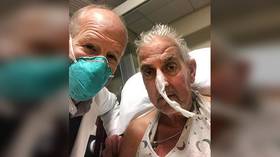Patient gets animal heart in ‘breakthrough’ surgery

An American hospital patient in the state of Maryland is reportedly in stable condition just days after he received an experimental pig heart transplant as a last resort.
David Bennett, 57, consented to the experimental transplant after realizing it was his final shot at surviving terminal heart disease due to his ineligibility to receive a human heart.
“It was either die or do this transplant. I want to live. I know it’s a shot in the dark, but it’s my last choice,” he said before the surgery took place.
While the experiment appears to have been successful, with Bennett breathing on his own just three days after the operation, he remains connected to a heart-lung machine and his condition will continue to be monitored for several weeks.
“This organ transplant demonstrated for the first time that a genetically-modified animal heart can function like a human heart without immediate rejection by the body,” said the University of Maryland School of Medicine, whose scientists performed the procedure.
Bartley P. Griffith, who transplanted the pig heart into Bennett, claimed the “breakthrough surgery” brings mankind “one step closer to solving the organ shortage crisis.”
“There are simply not enough donor human hearts available to meet the long list of potential recipients,” Griffith explained, adding that though the scientists were “proceeding cautiously” with their research, they are “optimistic that this first-in-the-world surgery will provide an important new option for patients in the future.”












